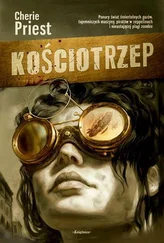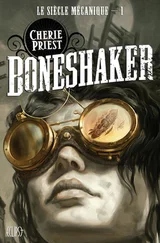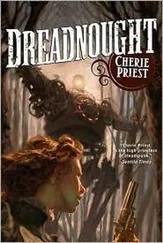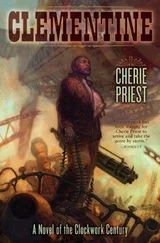But she was one of them now. She knew how they worked, and these two men were working on her—she was almost certain of it.
There was always the chance they were Pinks after all, sent as backup or as checkup. It’d happened before, that work was spread among agents, and they’d catch one another up in a more or less friendly fashion in their free time.
She angled her next turn to catch their reflections in a shop window advertising warm winter cloaks. Two white men. Both dark-haired and dressed for indoor work, but not expensively. If these were Pinks, they didn’t come from the Chicago office—she would’ve recognized them—but there were four other offices, so she couldn’t assume they didn’t. She could, however, take note of their appearance and shoot a telegram back to her employer. If they were from her organization, she’d raise a stink. She didn’t like being second-guessed.
In truth, Maria did not think they were Pinks. But if they weren’t, they were hired hands from some other corner, and she wasn’t ready to handle that prospect yet. What corner might it be? There were other agencies, to be certain—the biggest and best-known in the South was probably the Baldwin-Felts company. She hoped it wasn’t them, as she didn’t think much of that particular establishment.
Of course, depending on who you asked, the Pinks weren’t much better. But she had a badge for the Pinks, and could reasonably expect to be safe from friendly fire. As for the other, God only knew.
She took a sharp turn, a fast one that she saved for the last second, and kept a brisk pace but did not run. No one runs unless they want to be chased. Better to let the sidewalk crowds buffer the distance between them than become a casualty to whatever might otherwise transpire.
She didn’t dare look over her shoulder. She waited at an intersection because she had to, and when a glass-windowed cabriolet went lumbering by, she scanned its reflections for the men behind her and spotted one of them. Only one? Maybe the vehicle passed too quickly, and she’d missed the other. Or maybe the other man had broken off from the direct chase, and was circling around from a new direction.
While she waited for the traffic director to give her leave, her mind raced.
How much farther to the station? No more than a few blocks, surely. Any available shortcuts? She didn’t know the city well enough to say for certain. She swallowed hard and, when the traffic director waved her across the road, she continued onward, still pretending that nothing was wrong, no one was behind her, and hers was an ordinary errand to the train station—no different from a thousand other ordinary errands performed every day.
Under pretense of stopping to adjust her shoe, she surreptitiously checked and confirmed that one fellow was still on her tail—the fact of this never more obvious than when he realized she’d paused … and he did likewise, investigating a news stand with sudden, intense interest.
“Maybe he’s an amateur, or a Baldwin after all,” Maria griped as she straightened up and resumed her path.
A sign posted beside the road pointed an arrow at the station, noting that she was still over a mile away; so, her recollection of how the city worked had been foggy indeed. She swore under her breath. A mile was a long way to run, and a long way to evade anybody. It gave the men plenty of time to close in on her, cut her off, and do whatever it was they planned to do.
And she still didn’t see the second fellow. He could be anywhere.
However, she did see one of the new electric streetcars clattering toward her. It wasn’t pointed in the right direction, except that right now the right direction amounted to “anywhere else but here.”
Chicago did not yet have these electric street lines, so she had no experience with such things. She sized up the elongated, open-air car. It didn’t look too complicated. When the painted trolley came close enough for her to touch it, she reached out and grabbed one of the vertical poles along its exterior, like she’d seen people do in other places during her travels.
It didn’t move quickly, but it moved determinedly, yanking her off her feet with exactly the precision and insistence she’d hoped for. She grunted with surprise, then smiled as her feet found a step. Tightening her fingers around the bar, she shielded her eyes from the sun shimmering off the frosty city. She spied the first man at the curb behind her, visibly aggravated that he’d arrived too late to join her.
Moments later she saw the second man hunting down a side street. He did not see her hanging off the side of the streetcar like she did this every day, like any of the other passengers who took such a casual attitude toward their transportation and bodily safety.
When she felt confident that she was unaccompanied, at least temporarily, she waited for the next stop and asked the driver if he could help her reach the train station.
The driver delivered the gentle admonition that she’d gone the wrong way, and she pretended she hadn’t known—because every man liked to be a hero, or at least enjoyed being of service to a lady in distress. And why deny the nice gentleman a warm feeling of helpfulness?
She finally made the right connection, and soon she reached the station, bought her ticket to Fort Chattanooga, and positioned herself comfortably on the last train of the day to the fort as the train prepared to depart.
Maria sat next to the window but turned her face away from it, in case anyone had caught up to her. She had no doubt that whoever’d sent the two men would learn her location soon enough, but there was no reason to make it easy for them.
The train lurched forward and found its rhythm.
And now she had hours before her with nothing else to do but familiarize herself with the nurse’s missives.
The pages were difficult to skim, due largely to the questionable handwriting of the woman who’d composed them. At a glance Maria could see that the nurse had never enjoyed more than a few years of formal schooling, as the earnest, rounded letters showed the charming diligence of a child’s hard-practiced lessons. But there was nothing charming or childlike about the message these shaky letters conveyed.
She checked the most recent letters and saw that the handwriting improved over the course of the correspondence, practice making something closer to perfect. Even so, the early pages were slow going, and the rollicking track of the train gave Maria a case of motion sickness that almost made her quit trying; surely it would be easier to finish the reading from a stationary location.
But a phrase leaped out at her. She drew the page in question up close to her face.
“… if you could hold him still for long enough, a doctor would pronounce him dead.”
Her attention now more fully engaged, she made the effort to peruse the entire section from whence the eye-catching line emerged.
I have now seen four cases here in the underground, and they all go the same: First, the victim breathes up some gas—usually because a mask springs a leak, or isn’t fixed good on his face in the first place. But sometimes it happens because the mask gets knocked off, or one of the tunnels isn’t sealed up as good as everybody thought. Doesn’t matter how it gets inside, it always goes the same.
After a man breathes it, his nose starts running with yellow mucus, and the mucus is sometimes bloody. Sores break out around his eyes, ears, and mouth. It looks like the gas is eating him up from the inside out. Then the heart stops, the pulse quits. No more spit or tears, and the skin around his eyes turns yellow. He starts panting, and it sounds like his lungs are being chewed up into rags. You will never forget what it sounds like, when he breathes. For that matter, if it weren’t for that breathing, you’d never know he was alive. Everything else about his body has done stopped, like he’s been killed by a plague. If you could hold him still for long enough, a doctor would pronounce him dead.
Читать дальше










